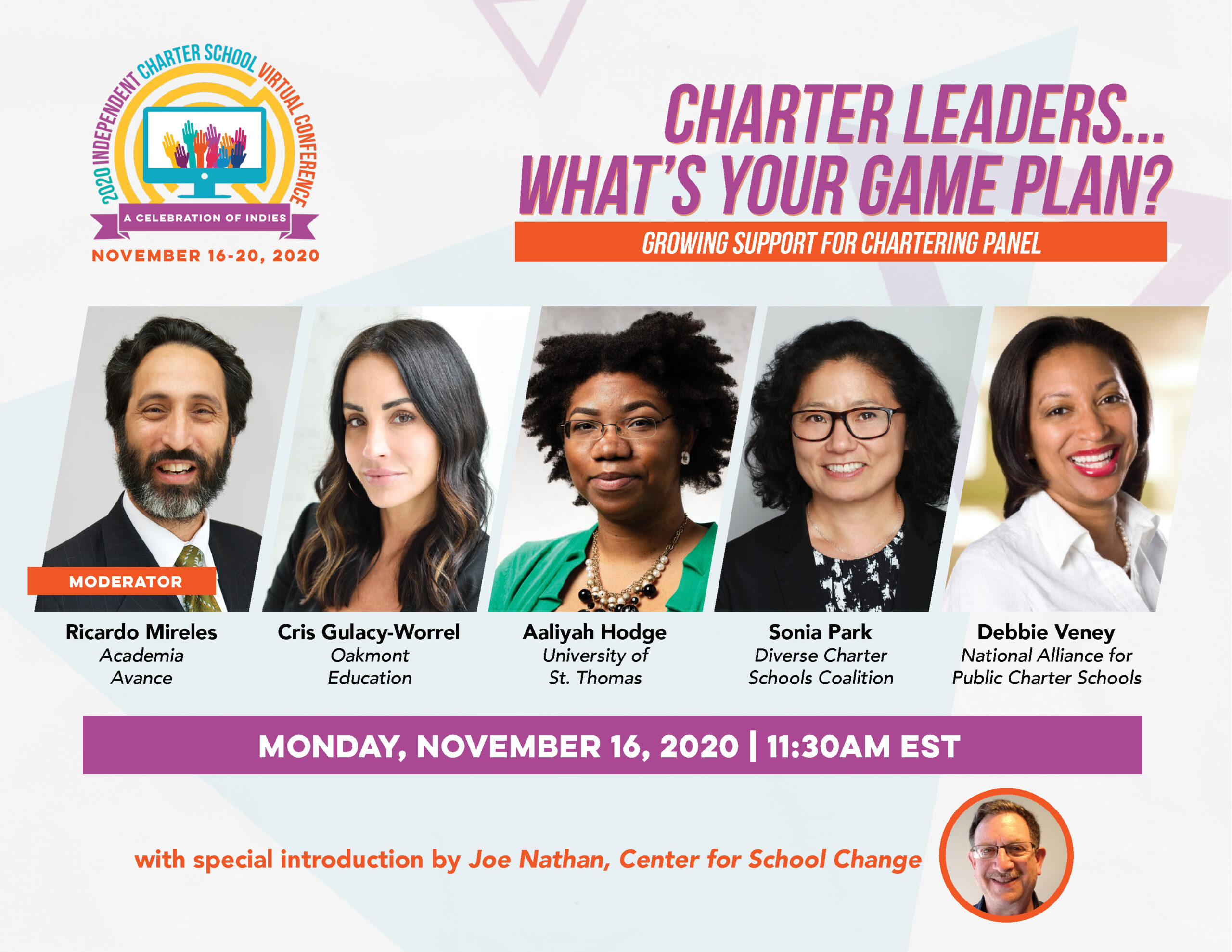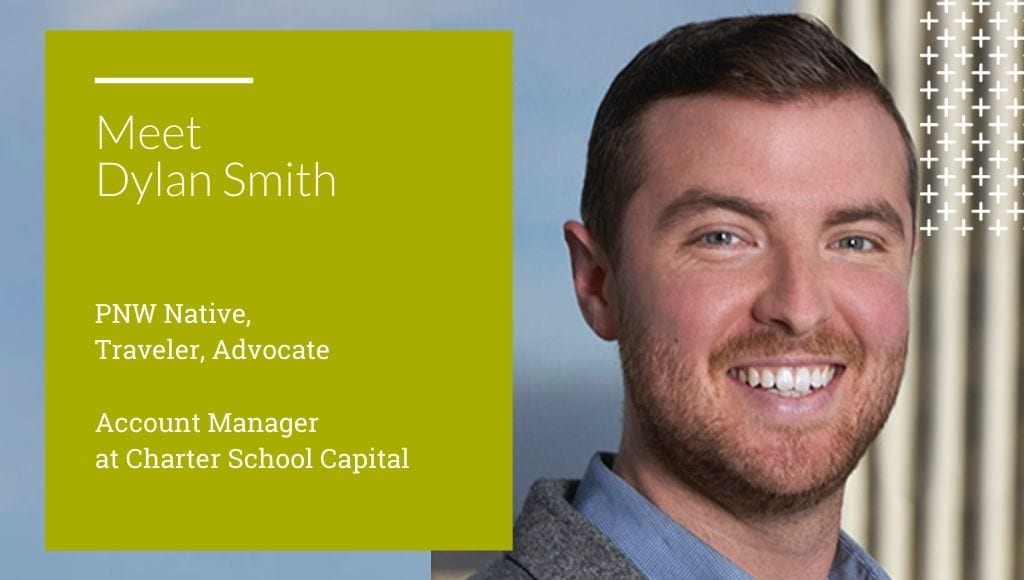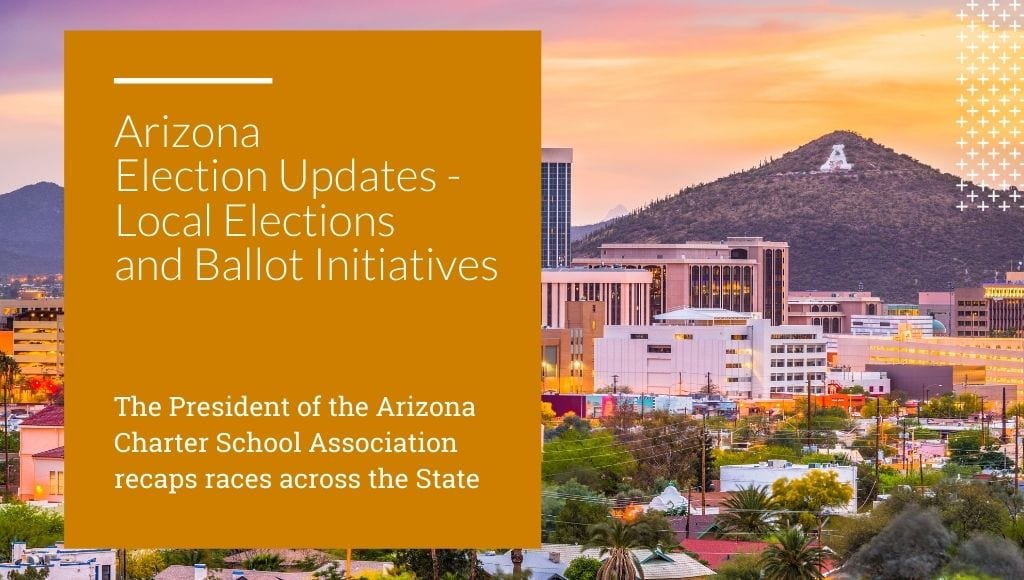
The 2020 CPICS conference kicked off with a strong start from a plenary panel moderated by Ricardo Mireles, leader of Academia Avance, and with speakers Cris Gulacy-Worrel of Oakmont Education, Debbie Verney of the National Alliance of Public Schools, Aaliyah Hodge of the University of St. Thomas, and Sonia Park of the Diverse Charter Schools Coalition.
Assuming the conference organizers intended for this panel to set the conference’s tone, the panel delivered – and then some. More than a conversation, this panel was a rallying cry, a call to action.
It’s worth noting that Ricardo Mireles and Cris Gulacy-Worrel recently joined forces with Angelica Solis-Montero of the Coalition for L.A. Excellent Public Schools to speak up on this very topic. In a recent opinion piece published in the Orange County Register, they argued that Democrats need to know that Black and Latino families will not abandon self-determination in choosing the public educational option that is best for their children.
A New Day – and An Unstable Time
Ricardo started the conversation by talking about the political sea change in the wake of the elections. The undeniable reality of the moment is that there’s a changing of the guard, which brings chaos, uncertainty, and an opportunity. With that, Ricardo asked the panelists the poignant question, “what is the game plan?”
The first panelist to speak was Cris, and Ricardo made it a point to ask her specifically about Ohio’s educational environment (or perhaps this would be better said as the political environment in Ohio as it refers to education).
Cris emphasized that this is a very unconventional, unstable time and therefore the game plan is not set in stone. In her view, the focus is really in the Secretary of Education. In Cris’ opinion, this will be like a rock thrown in the water, and we’ll have to see the many ripples it creates.
The View from Ohio
In Ohio, historically, charter schools have been supported by the Republican party, shared Cris. Consequently, the current temperature is moderate. Ohio might be more open to school choice going forward. Vouchers remain incredibly contentious, as those go to private schools. And the big challenge is that far too often, people lump charter schools with vouchers, not understanding the differences.
Cris shared how she is personally taking a lot of her time and effort to speak to caucuses, and all kinds of people, trying to get them to understand school choice is about self-determination; that school choice is a human right. Cris stresses how frustrating it is for her as a woman, as a Latina, to see this disconnect on the Left, where her self-determination is validated when it comes to reproductive rights but dwindles when it comes to being able to steer the academic future of her child.
Plants Need Sunlight
In lamenting the lack of support for charter schools from the Left, Cris uses a metaphor: “We’re plants, and we adapt – but we have no sunlight. We want that support. We want the sunlight so that we can grow to our potential.”
“I’m Cuban American,” says Cris. “I’m really hounding what does it mean to be progressive. What does it mean to pursue self-determination? Why does a white woman get to say what’s best for my children? When does the lever get pulled, that my actual choice is no longer viable? Why, once my child is born, am I no longer able to understand what’s best for my children, what’s best for my family? Because the neighborhood school may not be working for someone. And these are public charter schools, and it’s no longer good enough to say ‘Yeah but.’”
Debbie Verney spoke next. She emphasized the current focus on educating both candidates in the runoff election. “We’re not just bipartisan – we don’t have permanent enemies, we don’t have permanent friends. If you’re with us, good. And if you’re not, we’re coming for you,” she said.
Debbie quoted a study by the Georgia Charter Schools Association, which states that upwards of 65% of all people in Georgia support charter schools. Across the political aisle, race or income. The National Alliance is deploying digital ads to target the runoff candidates to publicly let them know that charter schools understand what support looks like in their state.
The Next Secretary of Education: Needed Criteria
Debbie explained how the immediate focus is the Secretary of Education. “Rather than picking winners or siding with candidates, we’re talking about what a good candidate should look like.”
Debbie is thrilled about the Alliance’s collaboration with the Freedom Coalition for Charter Schools in drafting several letters that list what qualities define a good candidate for Secretary of Education:
Here are the criteria:
- Students and families first – someone who doesn’t place special interests above students and families
- Commitment to high-quality schools – the right person would not be committed to a governance model over high-quality schools. They would be agnostic in this regard and express the flexibility and curiosity to look for the solutions shown to be working.
- Empowering teachers and leaders – the right candidate would allow school leaders to serve the students. They’d give the leaders adequate flexibility.
- Reimagine learning – “We’re not stone-age capitalists anymore, so new models. A candidate stuck in the Stone Age won’t be a good Secretary of Education,” says Debbie.
- Equity in education – It’s time to empower Black and Brown schools. It’s time to lift up Black and Brown students.
- Systems experience – and here Debbie takes an aside to clarify that it shouldn’t be restricted to District experience. The candidate should not be ideological – they’ll need to work with a diversity of stakeholders, so a balanced perspective is essential.
Aaliyah Hodge spoke next, highlighting the educational scene in Minnesota. She introduced herself as the charter school authorizer for the University of St. Thomas as well as the Vice President of the charter school authorizers association. Aaliyah also runs a youth-driven Nonprofit she founded, called People for PSEO (Post-Secondary Enrollment Options).
Before expounding about Minnesota charters, Aaliyah took a moment to answer a question from the audience: “Doesn’t the move to charter schools signal the privatization of schools?”
“I don’t know what is more public than a group of community leaders who come together to decide this is what I want our kids to learn. Parents involved. Students involved. I don’t know anything more public than that,” says Aaliyah.
The View from Minnesota
Diving into education in Minnesota, Aaliyah shared some statistics. There are 167 charter schools in Minnesota, serving approximately 62,000 kids. Enrollment increased from 10,000 in 2001 to 62,000 in 2020, representing 7% of public school enrollment.
According to Aaliyah, 50% of the students are urban and 50% suburban. Many/most are from low-income families, and many are students of color. In terms of Special Ed, she has not seen a difference between District numbers and numbers in charter schools. All of this disproves the notion of charter schools cherry-picking students.
Aliyah described that her group meets with education financing committees. “We talk about charter schools,” she says. “We do one-on-ones with elected officials. We work on encouraging elected leaders to visit charter schools.”
Aliyah’s work includes building coalitions – including the MN Parent Union, the Senate for School Change, the Minnesota Charter School Association, and other policy organizations.
Aliyah spoke about the importance of student-led and school-led initiatives and her work in her own youth-led nonprofit. “None of us are lobbyists, but it’s important to have the people directly impacted by policies to lead these conversations. Student-led efforts, involving parents and students.”
Aliyah encourages school leaders not to assume anything. Both Democrats and Republicans will surprise you, she says. “Oh, my son goes to a charter school,” or, “I went to a charter school.”
“Stories matter,” says Aliyah. “Anecdotal data combined with quantitative data.”
She says it’s vital to meet legislators and elected officials and force them to challenge their assumptions – listing as an example the notion that charter schools don’t have elective boards. Charter schools DO have elective boards. And there are many other misassumptions.
“Working with young people requires actual engagement. Youth engagement is all about cooperation. They should influence the decisions that are made. We allow them leadership roles. We allow them to be advocates and advisors.”
The View from New York
Sonia Park spoke next and also started with a brief introduction. The Diverse Charter Schools Coalition represents 65 (and growing) intentionally-diverse charter school organizations, representing over 190 charters across 22 states and DC.
“We’re moving forward, and we’re not waiting on folks to tell us how to do things or how to move forward,” said Sonia.
She spoke about the uncertainty of education in New York. She also touched on New York City-specific challenges, such as the 250-charter school cap in the city, the conflation of screen public schools (magnet schools) and charter schools, and the problem of ‘zombie charters.’
Sonia also spoke of the need to identify allies. She says of how the effort has become hyperlocalized, needing to do a lot of local outreach, so they get to know you at an individual level as a school – as well as a re-education to officials.
“We Need to Lift Our Voices”
Sonia boasted proudly of charter schools meeting the challenge not just about pandemic but social justice – acting as a neighborhood hub for wi-fi, food distribution, and other necessities during the pandemic.
“We need to lift our voices and explain what we are, the populations that we serve. We ARE a part of the community. We represent the community – we have to be VOCAL.” Says Sonia.
“Some don’t want to make a lot of noise, the attention to pass by, not attract attention. I recommend the opposite. You don’t have to say “we’re better than our district counterpart,” but it’s uplifting your voice, which is very needed, especially with what’s happening right now.”
The Lowest Nail
Cris] brought up a metaphor of her own: “In Ohio, we have the mentality of the lowest nail. The lowest nail doesn’t get the hammer. I disagree. Now is the time to start amplifying what we’re doing. It doesn’t have to be a competition. We’re showcasing.”
Cris believes charter schools need to get rid of the lowest nail mindset. “Let’s be brave,” she urges.
Next, Debbie spoke about racism. She said, “It’s time to unpack the role of the white progressive. People who are ideologically aligned with us, but we seem to fall apart on charter schools. What’s in the mind of the white progressive? Why you have BLM sign, and you want to get rid of charter schools?”
She continued that they heard things like, “I understand why people like charter schools. But I just don’t think we should have them. I understand they serve our kids better. But I just don’t think we should have them.”
Taking the cue from Debbie, Aliyah also chimed in about racism. “Minnesota has been dubbed The Great White North. It’s incredible “not woke,” she says, looking for a graceful way to express an ungraceful reality. “They think chartering is a way for white folks to keep their kids away from district schools.”
“We have a lot of zombie authorizers. People who say, ‘well, our job is just oversight. We don’t need to do any advocacy.’ We need to be IN THIS. We can’t just sit on the sidelines.”
“We’ve had so many problems with racism. The state’s teaching force is 94% white. We’ll be increasing teachers of color.”
“We have to use the power that we have and the voice that we have in our platforms to advocate for our kids.”
Sonia Park then gave specific ideas for action.
“Te Left is putting a statement into every district hearing, every organizational hearing. It’s not charter specific, but it doesn’t mean that you can’t put in a highlight of your work. So we’ve put in statements in areas since now everything is Zoom. Verbal statements, written statements, uplifting your voice. In a way that is not as intimidating as going down to city hall.”
Sonia also spoke of being perplexed by white progressives. “I am deep down blue Brooklyn. I used to be an authorizer. My kids went k-8 in charters. And I still get the side-eye. ‘You support charter schools?’” she laughs. “Of course, I support them! We need to make sure that every child, every student can choose the school that is right for them.”
Ricardo reminded the audience of an opportunity: “Let’s be prepared. There’s more opportunity for our voices to be heard since there’s no travel with Zoom.”
Ricardo then brought up a key point about the pandemic, “COVID is about public health. But testing has been under-emphasized. But do you know if you’re asymptomatic right now? Schools can be the catalyst. There’s stuff that we can do about COVID right now – and charter schools are showing how.”
The One Word
Wrapping up, Ricardo asked the panelists for one final word each.
Cris chooses “Resilience.”
Debbie’s word is “Ground game.”
Get your ground game tight. We represent 3.3 million students. They have families. These can be deployed.
Aliyah’s word is “Platform.” She said, “Everyone has a platform. Use it. Our kids matter, our parents matter, our students matter.”
Sonia’s is “Fearless.” She said, “We need to keep pushing and not be afraid to do this right now. Crunch time. Policy. Funding. All of these things are happening now. Be fearless.”
To which Ricardo adds, COVID is scary – and we should be scared—but not paralyzed. Not panicked. Our concerns should lead us to action – we should not be afraid of taking action.






